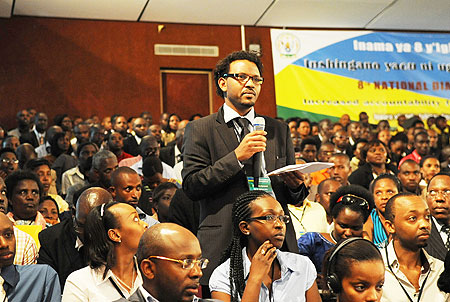PARLIAMENT - The 8th National Dialogue (Umushyikirano), ended, yesterday, on a high note with President Paul Kagame calling for renewed efforts to achieve the targets set during the two-day meeting. In his closing remarks, President Kagame commended the resolutions that were adopted after the meeting, saying that the dialogue presented a good platform to plot the way forward for the Rwandan people.


PARLIAMENT - The 8th National Dialogue (Umushyikirano), ended, yesterday, on a high note with President Paul Kagame calling for renewed efforts to achieve the targets set during the two-day meeting.
In his closing remarks, President Kagame commended the resolutions that were adopted after the meeting, saying that the dialogue presented a good platform to plot the way forward for the Rwandan people. He, however, warned that challenges still lie ahead, and extraordinary measures will have to be applied, to overcome them.
The President, highlighted the imperative for ownership of the targets by all Rwandans, whether living inside or outside the country, adding that, it would take everyone’s efforts to achieve the goals.
Kagame, noted that it is important that all Rwandans unite for a common goal - building the nation- irrespective of their differences in ideologies. He went on to say that the foundation is already firm, and all that is needed, is to continuously build on it.
President Kagame further pointed out that while situations are subject to change, all changes should be in the interest of national development and not for selfish reasons.
He emphasised that every item that was discussed in the dialogue must be implemented, noting that while leaders come and go, Rwanda as a country is a constant and her future generations must find it a better place.
Kagame, reminded the Rwandan people to reflect on the country’s bad history to make sure it is never repeated. He added that it’s inexcusable for anyone to deliberately forget the history of this country.
He cautioned those "thriving” on trading falsehoods with an intention of tarnishing the image of the country, warning that Rwanda will not tolerate anyone who seeks to destroy the achievements the people have registered through hard-work and sacrifice.
Kagame called on the participants to return to their respective duties with renewed determination because they owe Rwandans everything.
The Minister of Finance, John Rwangombwa, gave a presentation on the economic status of the country, particularly the performance of the financial sector. He highlighted the developing savings culture, as well as the macroeconomic performance.
Rwangombwa, who was supported by the Governor of the National Bank, Francois Kanimba, explained the progress of Umurenge SACCO, noting that there are about 415 SACCOS.
The Minister, however, pointed out the challenges hampering the full operation of the SACCOS, particularly, in adequate numbers of membership and lack of sufficient funds to fully operate as financial institutions.
Rwangombwa, commented on the progress of the capital markets in Rwanda, saying that the recent sale of the Bralirwa IPO, was extremely successful.
The Minister of Agriculture, Dr. Agnes Kalibata, assured the participants that the country is now food secure, in spite of the fact that long draughts affected food production across 22 districts.
Kalibata, went on to explain that there was a shift in Land use, saying that Land consolidation had grown from 2-46 percent, with the Ministry setting a target of 70% by 2013. She pointed out that one the major challenges with land consolidation was changing the mentality of some citizens who believe in traditional ways of farming.
The Minister of Health, Dr. Richard Sezibera, briefed the participants on the status of health insurance, declaring that 97 percent of the population is covered.
Participants who came from the Diaspora, including people who have been living in countries far apart as Malawi and Belgium, for the last 16 years, gave moving testimonies of their impression of the country and the remarkable development that has been registered as well as the striking levels of democracy and human rights, a picture far removed from what the people who have held them hostage, all those years, have been painting.
The National Dialogue, came up with various resolutions including, fast tracking the 12-year basic education, improving nutrition, efficient delivery of services in all sectors and implementing programmes aimed at improving agricultural production such as irrigation and land consolidation.
The dialogue was broadcast live on national radio and television and close to 100, 000 people following the proceedings online. The public was able to participate through texts messages and phone-in.
The event attracted representatives of the central and local government, legislators, the private sector, civil society, religious leaders, development partners, the Rwandan Diaspora as well as Diplomatic corps.
Ends


